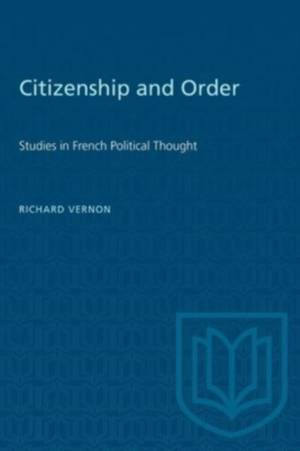
- Afhalen na 1 uur in een winkel met voorraad
- Gratis thuislevering in België vanaf € 30
- Ruim aanbod met 7 miljoen producten
- Afhalen na 1 uur in een winkel met voorraad
- Gratis thuislevering in België vanaf € 30
- Ruim aanbod met 7 miljoen producten
Omschrijving
The citizen, a figure capable of self-government is both the political and the personal sense, is a central and enduring theme of political thought. The role of the citizen in the modern state was question raised persistently by French political theorists from Rousseau on, as they sought new principles of legitimacy to replace those of the ancient regime. Richard Vernon's studies in this volume examine a series of moments in French political thought when the possibility and meaning of citizenship were called into question.
Vernon considers the view held by Rousseau and later Durkheim that citizenship was sustained immediately by moral principles, a view that was criticized by others who refused any such identification of political and moral order. Vernon shows how this refusal governs, in different ways, the political thinking of theorists as diverse as Maistre, Proudhon, Tocqueville, Comte, Sorel, and Bergson. He explains why the idea of citizenship in its political sense was exposed to so many objections, objections that may in turn suggest a new approach to the topic of political legitimacy.
Citizenship may once have been legitimated by ideas of moral, religious or cosmic order, but in a modern context it is the civic process itself that must exercise a legitimating function. Once, citizenship rested upon order; now, suggests Vernon, we may have to realize that order depends upon citizen.
Specificaties
Betrokkenen
- Auteur(s):
- Uitgeverij:
Inhoud
- Aantal bladzijden:
- 272
- Taal:
- Engels
- Reeks:
Eigenschappen
- Productcode (EAN):
- 9781487585440
- Verschijningsdatum:
- 15/12/1986
- Uitvoering:
- Paperback
- Formaat:
- Trade paperback (VS)
- Afmetingen:
- 156 mm x 234 mm
- Gewicht:
- 385 g

Alleen bij Standaard Boekhandel
Beoordelingen
We publiceren alleen reviews die voldoen aan de voorwaarden voor reviews. Bekijk onze voorwaarden voor reviews.











